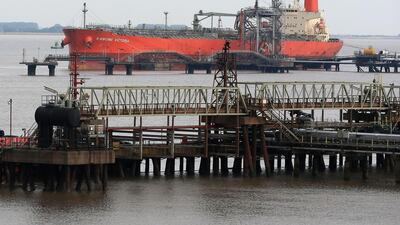One of the more lucrative opportunities in global commodities markets is about to get a little bit trickier.
What might best be described as detour trades - ships switching destinations to profit from higher cargo prices - will become more challenging to execute in 15 months’ time because of changes to the kinds of fuel vessels must burn, according to several industry analysts and a former engineer for AP Moller-Maersk.
The deviations - often delivering outsize profits to traders - will become tougher for two reasons, according to Bloomberg. The first is that fuel for the shipments looks like it will cost a lot more than what owners pay today, the second is that fuels may be incompatible from one supplier to the next, making topping up a more complicated task. Some shipping groups have even said the lack of a uniform product could cause their carriers to break down.
"It’s not like buying petrol at the petrol station where you can buy petrol from BP, Shell, Q8, whoever, mix it all up and it doesn’t matter," said Martin Verle, who serves on a US committee to help define fuels for the International Organisation for Standardisation. "From the supply side, nobody will guarantee that ‘my fuel’ is compatible with someone else’s."
The trading hindrance is the result of a switch from a widely used shipping fuel today to a range of cleaner options post-2020, when International Maritime Organisation rules to lower sulphur emissions will start.
Deviations might not be possible if a vessel needed to sail to a location where compatible fuel was unavailable, according to Mr Verle, who also previously worked as an engineer for Moller-Maersk.
"It could impact on where you trade if you know that fuels are incompatible,” he said, adding that using mismatched fuels might result in blocked filters, potentially leading to engine blackouts. "Companies are going to really have to be on the ball with their fuel management procedures.”
Detour trades happen intermittently, often helping to avoid localised shortages of a commodity when there’s an unexpected disruption in the supply chain. A batch of petrol tankers heading toward New York switched away last month because of market conditions and the arrival of Hurricane Florence. Numerous gas carriers, crop carriers and crude tankers deviated over the past year for various reasons.
"Traders make a margin on responding to events," said Alan Gelder, vice president for refining, chemicals and oil markets at consulting firm Wood Mackenzie. “They do best when they’re major, unforeseen events ... It’s an important part of their income. It’s probably disproportionate in terms of profitability versus volume."
Even without the compatibility issue, the price of ship fuel looks likely to affect trading.
_______________
Read more:
Sulphur crackdown will leave dirty fuel nowhere to hide
Middle East bunkers provide safe port in IMO 2020 storm
_______________
Cleaner, compliant fuels for purchase in 2020 are already trading at large premiums to today’s dirty bunkers. Since fuel is an owner’s single biggest cost, this would make shipping more expensive. Transactions involving lower-priced commodities like iron ore, where freight is a larger part of the delivered cargo cost, stand to be hardest hit, said Mr Gelder.
In today’s market, fuel compatibility isn’t such a big issue. Shippers generally only have to match a couple of specifications to mix fuels. From 2020, they will have to choose between different marine fuels which won’t necessarily be interchangeable.
"It’s fair to say that it will make trades involving cargo diversions harder, but there are many variables," said Peter Sand, chief shipping analyst at industry association Bimco, adding that he expects ship owners to be prepared and take precautions.
Some shipbuilders anticipated environmental changes before they became regulations. Bermuda-based ship builder Teekay started designing next generation tankers several years ago. Its One Spirit is a revolutionary vessel with the potential to change the future of shipping, according to World Maritime News. The company’s eco-design reduces consumption by 30 per cent, dramatically reducing voyage costs and providing a more environmentally efficient solution to transportation.
The One Spirit design has three key innovations: an aerodynamic hull (total savings of 17 per cent with wave impacts); “G” type engine de-rated (savings of 6 per cent); and slower propeller, 20 per cent larger in diameter.
The vessel design is so efficient, it is already compliant with 2025 Energy Efficiency Design Index requirements.
"The commitment to reduce our impact on the environment is integrated into our business acting as a driver for innovation and strategies that support long-term sustainability," Teekay says.
The two main clean marine fuels from 2020 will be an existing 0.1 per cent sulphur product and a new batch of so-called bunkers with maximum 0.5 per cent sulphur, according to Bloomberg. Shippers also have the option of continuing to burn today’s dirtier fuel, but must first install scrubbing equipment. Following the transition, availability at smaller ports not used to stocking different products could be challenging.
"If you’re mixing 0.5s and less-than 0.5s, and there’s carbon residue in the fuel, the risk will be worth considering," said Rudolph Kassinger, who has more than half a century of experience of refining and petroleum quality testing.
Shippers looking to dodge the problems by sticking with one fuel or the other face a number of snags. The 0.1 per cent product has been available for years, Mr Kassinger says, but it’s less commonly used because it’s more expensive.
At the same time, the new 0.5 per cent fuels could be made through different refining processes, or from different crudes. Some will likely contain asphaltenes, others won’t. If they’re mixed together, the asphaltenes could drop out to form a sludge that could damage the ship’s engine.
For owners and traders, those fuel challenges will compete against the commercial imperatives to move cargoes profitably.
"Owners will be stuck between a rock and a hard place,” said Mr Sand.
"After all, they make money when they sail, not when they say no to a fixture."

